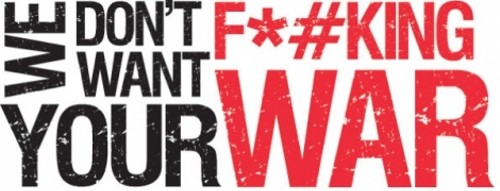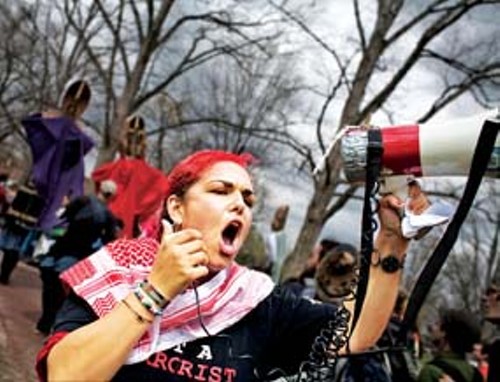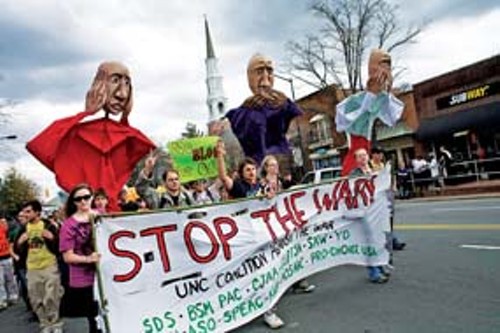Feature | We Don’t Want your F*#king War: Had enough? Sixties throwback Students for a Democratic Society returns to campus
By Lisa SorgThe man in the dark sunglasses snapping photographs in a springtime antiwar demonstration at University of North Carolina-Chapel Hill was working for the state-sponsored surveillance squad, ISAAC. And through his viewfinder, this dutiful employee of Information Sharing and Analysis Center, which operates out of the N.C. Attorney General’s office and the state’s Department of Crime Control and Public Safety, could watch entertaining, impassioned street theater: Ten-foot papier-mâché puppets towering over an Iraq War veteran delivering an emotional speech; Radical Cheerleaders leaping into the air while chanting catchy antiwar slogans; and a woman flying an Iraqi flag, which fluttered near the Students for a Democratic Society banner. And there was drumming, lots of drumming.
The protest, sponsored by the UNC Coalition Against the War and spearheaded by SDS, was one of 90 nationwide demonstrations held at college campuses and high schools last month [March ’08]. While many students scurried into the nearby Lenoir Dining Hall or watched passively from the sidelines, the 400 or so demonstrators who marched from campus through downtown Chapel Hill symbolized a victory for the local SDS chapter, arguably the most organized and outspoken anti-war group at UNC.
By taking the name SDS, the new generation of activists have refreshingly reinvigorated the radical spirit of their ’60s counterparts. Yet, the SDS and its 240 chapters are also inheriting their predecessors’ baggage: the ultimate failure to meet their goals. By the end of the 1960s, the original SDS had imploded due to infighting among its leadership. And its two pillars of protest, the Vietnam War and racism, continued; the former until 1975; the latter lingers into the 21st century.
“It’s useful to look at the old SDS as one of the best student organizations in the country,” says Ben Carroll, a UNC sophomore. “The spirit and the energy of the old SDS carries a great history, but we need to create a movement for today’s times rather than trying to recreate something from the past.”
The 21st-century SDS operates in a different era, against a different war, in a country with a different mindset. Unlike the Vietnam War, in which the supposed enemy was clear and, conveniently, distant, the Bush administration has framed the war in Iraq as “the global war on terror,” painting the opponent as an amorphous shape-shifter oozing through U.S. borders.
Without a draft to ignite national outrage, SDS is battling political complacency and nascence. A significant portion of Americans still believes Saddam Hussein was responsible for 9/11, according to a New York Times poll conducted in late 2007. And the idea of mobilizing around a common cause means camping in front of Wal-Mart for a post-Thanksgiving sale.
“People don’t have as direct of a stake in what’s going on,” says UNC junior Clint Johnson. “There is no draft, and that’s why we had the draft-card demonstration.”
In late February, SDS organized a mock recruiting station at UNC at which an Iraqi war veteran spoke about his combat experiences and protesters burned fake draft cards. Many onlookers seemed puzzled, as if a draft card were as quaint as a ration booklet from World War II.
“We’re all drafted in the sense that we’re responsible for what’s going on; it’s a de facto acceptance on the part of the public,” Johnson says. “Not having a draft hurts, in that people don’t have a real incentive. That puts the current movement on a different plane of morality; people are protesting despite the fact they’re not facing the draft themselves.”
Hostility vs. Indifference
Kostas Harlan remains an SDS member, even though he has graduated. “It wasn’t like, ‘Well, I’m done with that,’“ he says. “I feel a sense of responsibility for what’s taking place in Iraq.”
Dick Reavis, a former member of the original SDS, now teaches journalism at North Carolina State University in Raleigh. He was the adviser to that school’s SDS chapter, but it collapsed due to lack of interest. “I like it that a group of students came together to oppose the Iraq war and called themselves SDS, but I don’t think it has much other relevance,” Reavis says. “I think the kids are facing a harder situation. The ’60s were confrontational. The whole style of politics is now more indirect, ironic, reflective—not confrontational. [During the March protest] there was leafleting on campus; people were either hostile or indifferent. We did encounter hostility [in the 1960s]. But we never encountered indifference.”
The UNC-Chapel Hill chapter launched in September 2006, shortly before former U.S. Attorney General John Ashcroft’s speech on campus. Since then, the group, which has about two dozen members, has led rallies and demonstrations at UNC and at Chapel Hill’s military recruiting station, and occupied the local office of U.S. Rep. David Price, who voted against the war and has urged the president to set a timetable for troop withdrawal. (A Price staff member called police, who arrested the protesters. A Raleigh civil rights attorney represented the SDS members in court; trespassing charges were dropped.)
The protest at Price’s headquarters points to a larger disagreement between SDS and the Democratic Party. Just as ’60s activist and former California lawmaker Tom Hayden noted in his 1962 Port Huron Statement—the founding document of the SDS—the Democratic Party, particularly [the South’s] Dixiecrats, “tolerates the perverse unity of liberalism and racism, prevents the social change wanted by Negroes, peace protesters, labor unions, reform Democrats and other liberals.”
Latest in Cover Story
Readers also liked…
-
Forget the family pedigree—Robert F. Kennedy Jr should not be the next president of the United States
Trojan Horse
- Jun 21, 2023
-
Women decry harassment and toxic culture at St. George auto dealership
Men at Work
- Oct 11, 2023






